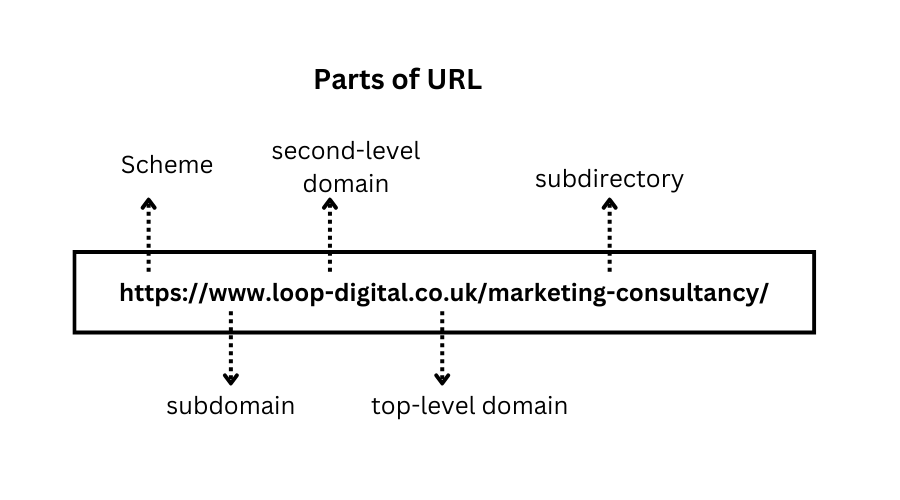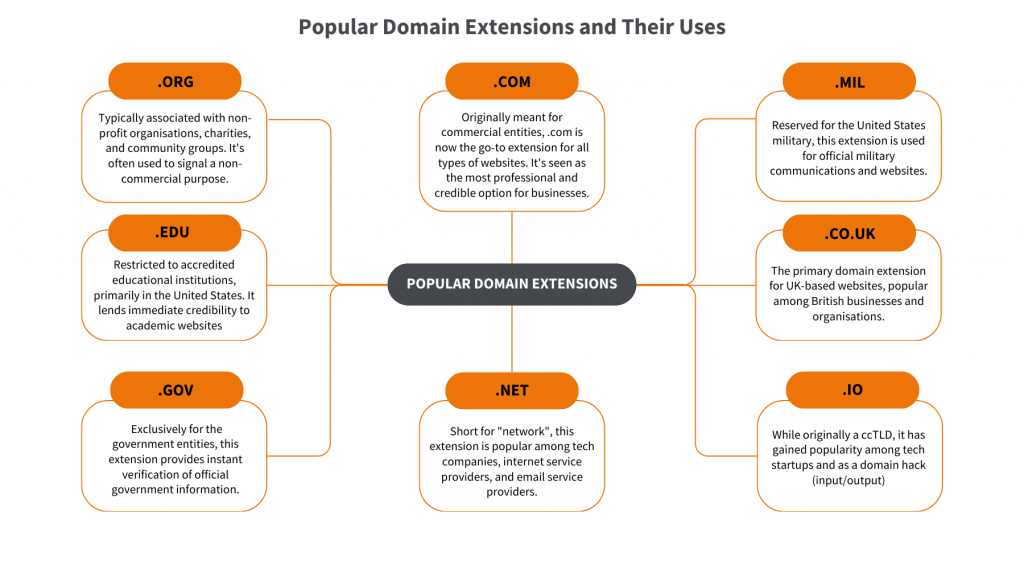Joseph, our web developer with a master’s degree in Computer Science, isn’t just driven by technology’s coolness; he enjoys transforming complex ideas into user-friendly interfaces. This passion for usability fuels his desire to stay up-to-date with the latest web development advancements. Beyond the technical (HTML, CSS, JavaScript, and other various backend languages), Joseph excels at framing complex functionalities within visually appealing websites. This artistic approach ensures users can seamlessly interact with the site, achieving their goals without getting tangled in technical intricacies. In his free time, Joseph enjoys football, long rides, and jamming to music, a well-rounded developer who bridges the gap between technical prowess and user-centric design.
Posted on 17/07/2024 by Joseph Narasisa
Everything you need to know about domain extensions
Read Time: 9 minutes
Why Domain Extensions Matter?

In 2024, your online presence is often the first point of contact between you and your audience. The core idea of your online presence lies in your domain name—your digital address on the vast internet. The domain extension that follows is just as important as the name itself. These seemingly small suffixes play a crucial role in defining your online identity and can significantly impact your website’s success.
There are over 350.5 million registered domain names worldwide, a figure that continues to grow annually. With such a crowded digital landscape, understanding domain extensions and choosing the right one for your website is more crucial now.
Let us understand domain extensions, and explore their types, importance, and how to select the perfect one for your online venture. This will help you make informed decisions about your digital presence.
What is a Domain Extension?
A domain extension, also known as a top-level domain (TLD), is the suffix at the end of a web address, following the final dot. For example, in the web address “www.google.com“, “.com” is the domain extension. These extensions serve as categories for internet addresses, often indicating the purpose or origin of the website.

Imagine your website’s address is like your house address in the real world. You’ve got the street name (your domain name) and then a suffix that tells you what kind of place it is – like an apartment (.apt), a house (.house), or maybe a fancy villa(.villa). Well, a domain extension is like that suffix for your website.
A familiar extension like .com tells people your site is likely legit, just like a house on a well-known street. Newer ones like .blog or .photography can hint at what your site’s about.
Domain extensions work as part of the Domain Name System (DNS), which acts like a phonebook for the internet. When you type a web address into your browser, the DNS uses the domain extension to help locate the correct website server.
Choosing the right domain extension is crucial as it can affect your website’s credibility, search engine optimisation (SEO), and overall brand image.
Types of Domain Extensions
Domain extensions come in various types, each serving different purposes and audiences. Let’s explore the main categories:
Generic Top-Level Domains (gTLDs)
Generic Top-Level Domains (gTLDs) are the most common and recognisable domain extensions. They include familiar suffixes like .com, .net, .org, .edu, and .gov. These extensions are not tied to any specific country and are often used for global or purpose-specific websites.
.com, short for “commercial”, is by far the most popular gTLD, accounting for about 51% of all registered domain names. It’s widely used by businesses, organisations, and individuals alike due to its universal recognition and perceived credibility.
Other gTLDs have more specific uses:
- .net (network) is often used for technology and internet infrastructure-related sites
- .org (organisation) is popular among non-profit and community organisations
- .edu is restricted to educational institutions
- .gov is exclusively for government entities
Country Code Top-Level Domains (ccTLDs)
Country Code Top-Level Domains (ccTLDs) are two-letter domain extensions that represent specific countries or territories. Examples include .uk for the United Kingdom, .us for the United States, .ca for Canada, .au for Australia, and .de for Germany.
ccTLDs are particularly useful for businesses targeting specific geographic regions. They can help improve local SEO and build trust with regional audiences. For instance, a .uk domain might be preferred by British consumers when shopping online, as it suggests a local presence and potentially easier returns or customer service.
Interestingly, some ccTLDs have gained popularity beyond their intended countries. For example, .io (originally assigned to the British Indian Ocean Territory) has become trendy among tech startups and developer tools due to its association with input/output in computer science.
Sponsored Top-Level Domains (sTLDs)
Sponsored Top-Level Domains (sTLDs) are specialised domain extensions sponsored and managed by private organisations. These extensions are typically restricted to use by specific groups or industries. Some examples include:
- .aero for the aviation industry
- .coop for cooperatives
- .museum for museums
While less common than gTLDs or ccTLDs, sTLDs can provide instant credibility and relevance within their respective industries. For instance, a website using the .aero extension immediately signals its connection to the aviation sector.
Internationalised Domain Names (IDNs)
Internationalised Domain Names (IDNs) are domain names that include non-ASCII characters, such as accented Latin letters, or characters from non-Latin scripts like Arabic, Chinese, or Cyrillic. IDNs have played a crucial role in making the Internet more accessible and inclusive for non-English speakers.
For example, a Chinese company might use a domain name entirely in Chinese characters, making it more memorable and user-friendly for their local audience. As of 2023, there were over 9 million IDN domain registrations worldwide, highlighting the growing importance of linguistic diversity online.
New gTLDs (ngTLDs)
New generic Top-Level Domains (ngTLDs) were introduced to expand the domain name space and offer more options for website owners. These include extensions like .xyz, .club, .online, and .store. Since their introduction in 2013, over 1,000 new gTLDs have been delegated, leading to millions of new domain registrations.
ngTLDs offer more descriptive and brand-specific options. For instance, a fitness studio might opt for a .fitness domain or an online retailer could use .shop. These extensions can help businesses create more memorable and industry-specific web addresses.
Importance of Domain Extensions
Domain extensions play a vital role in your online presence, affecting various aspects of your digital strategy:
- Branding: Your domain extension is part of your online brand identity. It can communicate the nature of your website (e.g., .org for non-profits) or your geographic focus (e.g., .co.uk for UK-based businesses).
- Search Engine Optimisation (SEO): While Google has stated that new gTLDs don’t have a direct impact on search rankings, certain extensions can indirectly influence domain authority and SEO. For instance, country-specific extensions can help with local SEO efforts.
- User Trust: Traditional extensions like .com often inspire more trust among users. A study by Domain Name Wire found that 67% of consumers trust .com domains more than new gTLDs when shopping online.
- Memorability: A relevant and catchy domain extension can make your web address more memorable. For example, a domain like “dance.studio” might be easier to recall than “dancestudio.com“.
- Availability: With millions of .com domains already registered, newer extensions offer more opportunities to secure your desired domain name.
Popular Domain Extensions and Their Uses
Certain domain extensions have become synonymous with specific purposes and industries. Understanding these popular domain extensions can help you choose the most suitable one for your website, enhancing its credibility and relevance. Let’s delve deeper into some of the most common domain extensions and their typical uses:

Choosing the Right Domain Extension
Selecting the appropriate domain extension requires careful consideration of several factors:
- Target Audience: Consider where your audience is based. If you’re targeting a specific country, a ccTLD might be appropriate.
- Industry or Niche: Some extensions are associated with particular industries. For example, .tech for technology companies or .photography for photographers.
- Branding and Memorability: Choose an extension that aligns with your brand and is easy for users to remember.
- Availability and Cost: Popular extensions like .com may have limited availability and higher costs. Consider alternative extensions if your preferred .com domain is taken.
- SEO Considerations: While the extension itself doesn’t directly impact SEO, using a country-specific extension can help with local search rankings.
- Trustworthiness: Consider how your chosen extension might be perceived by your audience. Traditional extensions often inspire more trust.
Remember, it’s not always necessary to stick with .com. While it remains the most recognised extension, alternatives can sometimes offer better branding opportunities or availability.
Registering for Domain Extensions
To register a domain name, you’ll need to use a domain registrar—a company accredited by the Internet Corporation for Assigned Names and Numbers (ICANN) to sell domain names. Some popular registrars include GoDaddy and Google Domains.
When choosing a registrar, consider factors such as pricing, customer support, additional features (like privacy protection), and user interface.
The registration process typically involves these steps:
- Search for your desired domain name using the registrar’s search tool.
- Choose your preferred extension(s).
- Add the domain(s) to your cart.
- Select the registration period (usually 1-10 years).
- Provide your contact information.
- Complete the payment process.
After registration, you’ll be the official owner of the domain for the specified period.
Managing Domain Extensions
Proper management of your domain name is crucial for maintaining your online presence:
- Domain Renewal: Domains are registered for a set period, after which they need to be renewed. Failing to renew can result in losing your domain name. Set up auto-renewal or reminders to avoid this.
- Domain Transfer: You may want to transfer your domain to a different registrar for better pricing or services. This process usually takes 5-7 days and requires you to unlock your domain and obtain a transfer authorisation code.
- Changing Ownership: If you sell your website or business, you may need to transfer domain ownership. This typically involves updating the WHOIS information associated with the domain.
- Security: Protect your domain from unauthorised transfers or changes by using features like domain locking and two-factor authentication.
Partner With Loop Digital for Domain Management
Managing domains effectively can be complex, especially for businesses with multiple web properties. At Loop Digital, we understand the challenges and offer a helping hand with our professional domain management services.
Here at Loop Digital, we provide comprehensive domain management services, including:
- Expert advice on choosing the right domain extensions
- Streamlined domain registration and renewal processes
- Secure domain transfer services and Hosting solutions
By partnering with Loop Digital, you can be confident that your online presence is built on a solid foundation of well-managed domain names. Our team of experts stays up-to-date with the latest trends and best practices in domain management, allowing you to focus on growing your business.
Take the first step towards a more secure and efficient online presence. Book a 30-minute free consultation with us today to learn more about how our services can benefit your business. Let Loop Digital be your trusted partner in navigating the digital landscape.
Looking for your next opportunity?
Digital marketing careers
We’re always on the lookout for talented individuals to join our ever growing team. If you think you’d be a great match for Loop Digital, we’d love to hear from you.

Join 300+ business owners getting weekly growth strategies - subscribe now.
"*" indicates required fields






